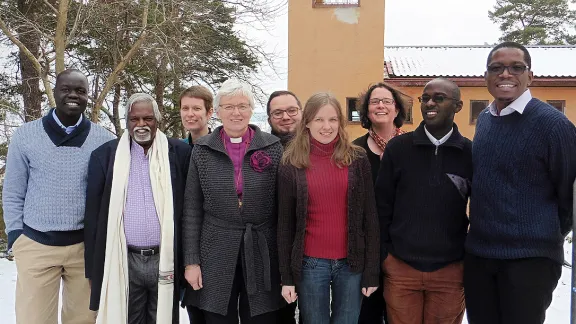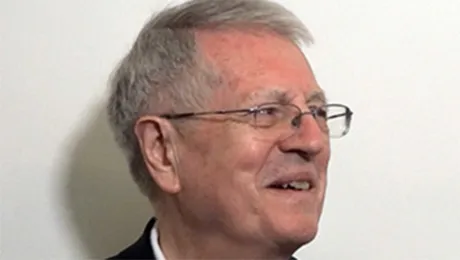
Rev. Dr Busi Suneel Bhanu (second left), other LWF member church representatives and staff, at the February meeting of the study group on Lutheran engagement in the public space, in Sigtuna, Sweden. Photo: LWF
Interview with Rev. Dr Busi Suneel Bhanu on the role churches play in the public space
(LWI) – The church is a public space for people with diverse attitudes and orientations to share their ideas and resources for the wellbeing of all, says Rev. Dr Busi Suneel Bhanu, who took part in a global discussion on religion in the public space in Sigtuna, Sweden. One of the findings from the February meeting of The Lutheran World Federation (LWF) study group on Lutheran Engagement in the Public Space was that equal access, safety and meaningful participation are the three aspects that make it possible for all people in society to engage in the public space.
Bhanu shares his reflections on caste-based discrimination, which recently led to violent protests by farm owners in India’s northern state of Haryana.
What are some of the factors that inhibit equal access to public space in India?
India’s 1.3 billion people live in a pluralistic society marked by several cultures, religions and social classes. In the name of what many describe as “ritual purity and pollution,” there are more than 210 million people categorized as untouchables or Dalits—the lowest of the lowest in the caste system. Insensitivity to gender justice, the growing phenomenon of religious intolerance and increasing indifference to the hope and aspirations of the poor and other vulnerable groups are some of the factors that inhibit equal access to public space.
Insensitivity to gender justice, the growing phenomenon of religious intolerance and increasing indifference to the hope and aspirations of the poor and other vulnerable groups are some of the factors that inhibit equal access to public space [in India].
Whose voices and issues need to be heard more and why?
There are three issues that stand out in the Indian context: the rights of Dalits, women’s dignity and human sexuality.
Dalits: Although caste-based discrimination is outlawed in India, there are serious gaps in the implementation of this legislation. The social stratification of Dalits as untouchable means that they are ordinarily assigned the most dirty, menial and hazardous jobs, and many are subjected to forced labor. Most of them have limited access to resources and live in severe poverty. The majority of India’s population-–80 percent -- is Hindu, and most Christians are Dalits.
In February precious lives were lost and public property was destroyed, as private land owner sub-caste groups in the northern state of Haryana demanded their rightful access and participation in the country’s economic sector. Their livelihoods are seriously threatened by diminishing agricultural yields due to recurring failure of monsoon rains. The daily labor wage in the private sector ranges from 249 to 300 rupees (USD 3.83 to 4.61), while a worker in the public sector is entitled to a daily rate of between 670 to 945 rupees (USD 10.30 to 14.53). In addition, a government appointed commission recommended a minimum monthly wage of between 7,000 to 18,000 rupees (USD 107.69 to 276.92). The agitations in Haryana were not only about the disparities of the caste system but also about the injustices of the country’s economic policies.
Women’s dignity: The freedom, choices, aspirations and dignity of women are eroded in India’s traditional and male chauvinistic ideals of a woman: a dutiful housekeeper, submissive to her husband and bears him children. Many still remember the 22-year old woman in Delhi who was gang raped by six men in December 2012, and later died from her injuries. The public protests over this case and widespread violence against women led to the amendment of the criminal code in 2013 to include stiff penalties for rape. Churches are called to speak out and act more for the dignity of women, who make up 51 percent of our population.
Human sexuality: In a predominantly conservative society, homosexuality is considered a taboo and thus criminalized, although some smaller sections of the society are in favor of de-criminalization. In its historic judgment of April 2014, the Supreme Court directed the government to declare trans-genders as a ‘third gender’ and include them in the Other Backward Castes quota. By bringing them into the mainstream, the court affirmed their legal rights, including marriage, adoption, divorce, succession and inheritance.
How can churches help to improve the quality of public conversations?
The church is a public space for people with diverse attitudes and orientations to share their ideas and resources for the wellbeing of all. Church, as the fellowship of the faithful and as the Body of Christ ought to be a pro-active agency to realize God’s mission here and now.
How is this LWF study process relevant for the churches’ work in India today?
I deeply appreciate the work and witness of the LWF and its many study processes that are becoming catalysts in renewing life in our societies. The meaningful participation of vulnerable communities will enrich the life of the society to which they belong. For the Indian church, this process is a challenge and wake-up call to for a life-affirming gospel that offers hope.
LWF Council Adviser Rev. Dr Busi Suneel Bhanu is a former bishop of India’s Andhra Evangelical Lutheran Church. He currently teaches religion, interfaith relations and Dalit theology at the Gurukul Lutheran Theological College and Research Institute in Chennai, where he also serves as dean of the Department of Research and Doctoral Studies.


